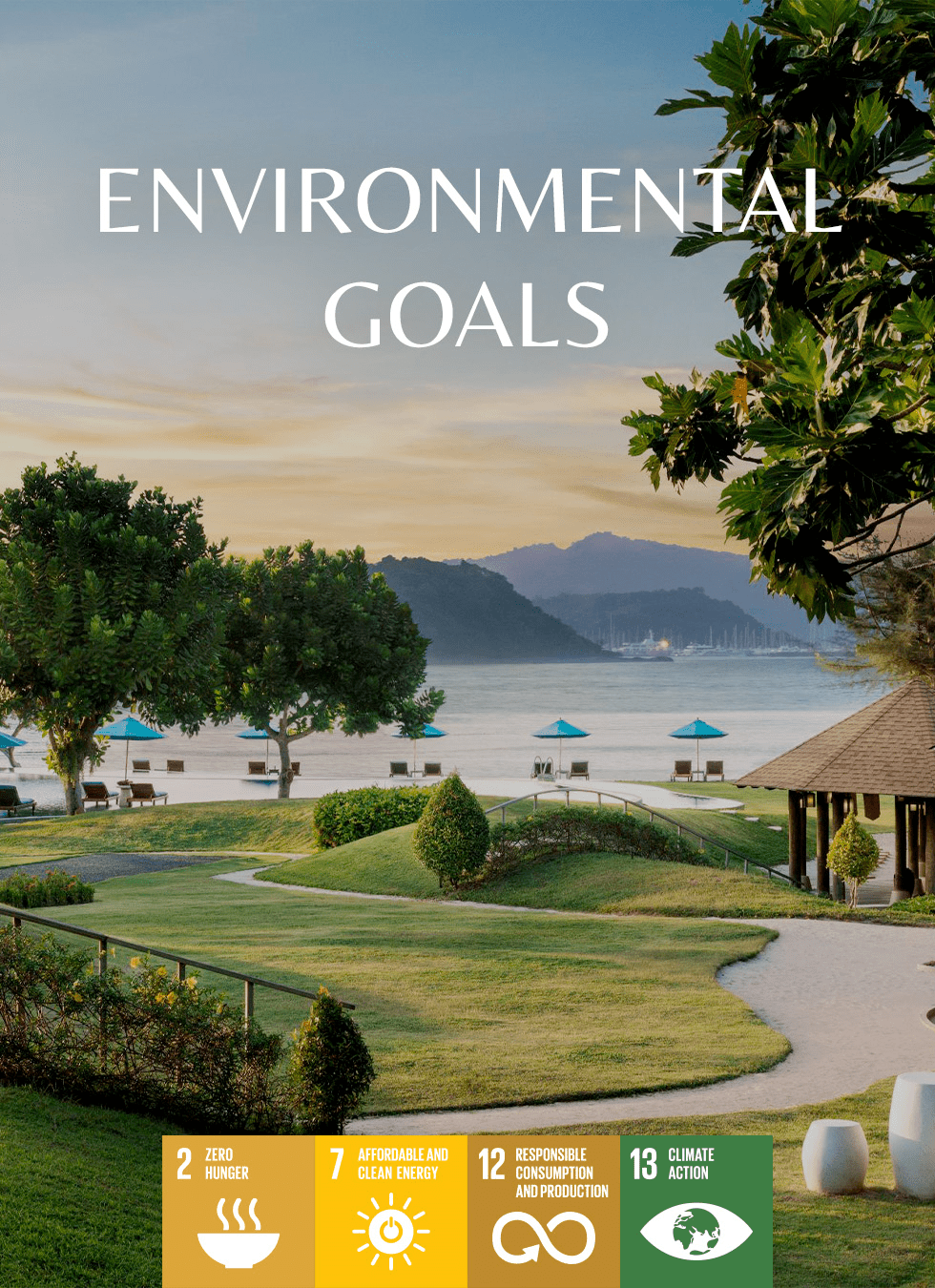


Sustainable Development Policy
The company operates its business under the principles of good governance, emphasizing sustainable supply chain management. It prioritizes environmentally friendly services that align with the lifestyles of modern travelers, supports collaboration to reduce climate change risks, improves resource efficiency, and promotes sustainable development.
Environmental Policy
Environmental Policy
The company is committed to creating job opportunities and enhancing knowledge in the hospitality sector. It aims to build sustainable destinations through community engagement, respect for cultural heritage, and care for employee well-being, while continuously developing its workforce in alignment with the company’s core values.
Human Rights Operations
Overview
The Erawan Group Public Company Limited places great importance on respecting and promoting human rights across all dimensions of its business operations. The company integrates international human rights principles and the United Nations Guiding Principles on Business and Human Rights into its business practices. This commitment extends from ensuring equal treatment of employees and eliminating discrimination, to promoting a safe and growth-conducive work environment, and closely monitoring business partners and vendors to strictly comply with human rights standards. We are dedicated to fostering a corporate culture that respects human dignity and supports sustainable shared growth throughout the value chain.
| Human Rights Risk Assessment Results | |
|---|---|
| Key Risk Issues | Preventive and Mitigating Measures |
| Community Rights and Environmental Rights | |
|
Environmental and safety concerns arising from company operations |
|
| Rights of Contractors and Business Partners | |
|
|
| Employee Rights | |
|
|
| Customer Rights | |
|
|
Human Rights Management
The company conducts its business responsibly, considering the impacts on all relevant aspects of the community, society, and stakeholders across the business value chain. It contributes to economic and social development through local and regional employment, promotion of decent work, support for community products, and business expansion into various areas. The company also enhances the capabilities of employees and communities by building skills and knowledge in hospitality services, fostering community careers, and supporting the sustainable development of tourism destinations. It promotes community engagement, respects local cultural heritage, ensures employee well-being, and fosters sustainable human resource development in alignment with corporate values.
Furthermore, the company has established a Human Rights Policy in alignment with international standards, including the Universal Declaration of Human Rights (UDHR), the United Nations Global Compact (UNGC), the United Nations Guiding Principles on Business and Human Rights (UNGP), and the Declaration on Fundamental Principles and Rights at Work of the International Labour Organization (ILO). The policy was revised in 2024 and is publicly available on the company’s website.
The company implements a comprehensive human rights risk assessment and due diligence process across the organization to identify potential human rights risks arising from its operations. Preventive measures are established to mitigate these risks, and remediation procedures are in place in case of any violations. A grievance mechanism is also available for individuals whose rights may have been affected. The Risk Management and Sustainability Development Committee is responsible for overseeing human rights issues throughout the entire process, ensuring effective implementation and achievement of set goals. This ensures that the company’s operations do not result in human rights violations across its value chain.
Human Rights Due Diligence (HRDD)
In 2024, The company conducts Human Rights Due Diligence (HRDD) in accordance with the United Nations Guiding Principles on Business and Human Rights (UNGP). This serves as the framework for identifying, assessing, and managing human rights issues, which comprises five key steps as follows:
Human Rights Risk and Impact Assessment
The Erawan Group Public Company Limited has conducted a human rights risk assessment within the organization, focusing on issues relevant to the hotel and service industry in alignment with international standards. The company has also established Key Performance Indicators (KPIs) to assess and monitor human rights-related risks, as follows:
Human Rights Risk Indicators of The Erawan Group PLC:
-
Child Labor and Forced Labor
The company monitors and prevents the use of child labor and forced labor within the organization and throughout the supply chain.
-
Inadequate Working Environment
Regular assessments and improvements are made to ensure a safe and appropriate working environment for employees.
-
Unfair Wages
The company enforces a fair wage policy in compliance with labor laws.
-
Discrimination
The company promotes equality and prevents all forms of discrimination in the workplace.
-
Freedom of Association and Collective Bargaining
The company respects employees' rights to freedom of association and collective bargaining in accordance with the law.
-
Harassment in All Forms
Preventive and corrective measures are in place to address all forms of harassment in the workplace.
Additionally, the company has developed a Human Rights Policy as a framework for its operations and human rights risk management. This includes identifying potential risks in key operational areas and defining measures to mitigate those risks.
Monitoring and Reporting
Relevant working groups review and monitor the implementation of the company’s human rights guidelines and mitigation measures. This ensures that the measures in place are effective in preventing or managing human rights risks. Where necessary, improvements are made, and progress is reported to management and relevant departments.
Grievance Management and Remediation of Impacts
The company places great importance on protecting and remedying individuals who may be affected by human rights impacts resulting from its operations. In cases where human rights violations occur, the company conducts a thorough investigation, analyzes the root causes, takes corrective actions, and enforces appropriate disciplinary measures. Remedial actions are provided to those affected, based on the context of each case.
The company also provides accessible grievance channels for individuals to report human rights concerns through its “Grievance Mechanism” as outlined below.
The company is committed to adhering to good corporate governance principles in accordance with applicable business regulations, rules, and laws. It promotes ethical business practices through its Code of Conduct and strictly opposes all forms of corruption, both domestically and internationally. The company respects human rights and is dedicated to responsible management across the entire business value chain, ensuring accountability to all stakeholders.